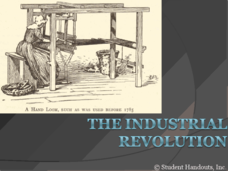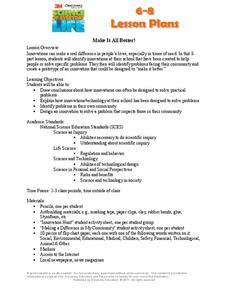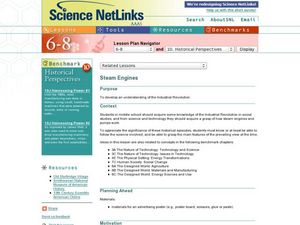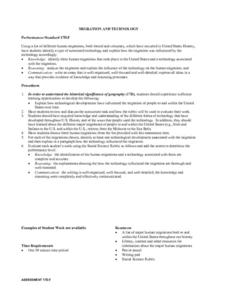Curated OER
Look! You're Wearing Geography
Sixth graders explore economic systems. In this economics lesson, 6th graders discover global markets. Students work in small groups to identify where their clothing and materials originated. Students locate countries on a map and...
Odyssey of the Mind
Odyssey of the Mind Curriculum Activity: GREAT TO COMMUNICATE
Humans love to communicate and they do it in so many different ways. The class investigates how people have used new inventions and technological innovations to communicate. They are divided into groups of three or four and given...
Curated OER
The Industrial Revolution
Contrasting between the "Haves" and the "Have-Nots" of 18th-19th century Europe, this presentation explores the social and technological implications of the Industrial Revolution. Inventions, social trends, and scientific breakthroughs...
Curated OER
Creatively Creating Expository Essays
Students, after reading Fahrenheit 451, brainstorm inventions that could have been in the novel. They present their invention to the class and writing an expository essay about their creation.
Rutgers University
How the Allies Won World War II: Island-hopping in the Central Pacific
Using primary source documents, young historians explore the strategies the US used to defeat Japan during WWII. They also learn about the American military experience, and innovations that changed the style of warfare. Young scholars...
Curated OER
Block Buster
Here is a unique and innovative game which will help your charges learn the important skill of proofreading and editing their own writing. The class is divided up into groups, and each group uses actual samples of writing from students...
Curated OER
Technology and Change
Students write a paragraph explaining how a technological innovation from a particular country has affected the world. Using a variety of resources, students identify a technological innovation, giving accurate historical and...
Curated OER
The African American Inventor
Students study various African American inventors and their contributions. They select their favorite invention and work in groups to research a specific African American inventor. After conducting their research, they share their...
Curated OER
Make It All Better!
High schoolers design an innovation that could help their community. In this technology lesson, students identify problems that could be solved by innovation. They present their ideas in class.
Curated OER
Make It All Better!
Middle schoolers brainstorm ideas to solve a problem. In this technology lesson, students share their ideas to class. They research innovations that could benefit the community.
Curated OER
Survey Savvy
Students explore various aspects of design innovation. In this design lesson, links are provided to three innovations from the Design for the Other 90% Web site in order for students to study and evaluate them. Students are challenged to...
Curated OER
The Automobile
Students are introduced to technological innovations that contributed to mass production of the automobile and how this allows large numbers of Americans to afford an automobile.
Curated OER
Steam Engines
Young scholars investigate the invention of the steam engine. In this technology lesson, students investigate the advancement of technology over time. They relate science and technology together.
Curated OER
The Golden Gate Bridge
In this comprehension worksheet, students read and respond to five multiple choice questions about the story. Then they explain in a short answer response why there were people who opposed to the building of the Golden Gate Bridge and why.
Curated OER
Writing Exercise: The Renaissance II
Here is a cross-curricular writing exercise with limited appeal as an engaging or interactive activity. A learning exercise on the Renaissance that has learners responding to 3 simple prompts, each of which can easily lead into deeper...
Curated OER
Migration and Technology
Learners identify a technological innovation associated with human migration, either forced or voluntary. They explain how the migration was influenced by technology and how technology influences migration through a written essay.
Curated OER
Economics Lesson: The Real McCoy
Students research the origination of the expression "The Real McCoy." In this economics research lesson, students read the book The Real McCoy. Students examine Elijah McCoy and his invention of the oil cup and how it relates to the...
Curated OER
Inventors of New England
Young scholars examine recent inventions and discuss the steps the inventor had to go through to develop this product. They share their ideas with the class.
Perkins School for the Blind
The Printing Process
The printing process was a technological innovation that revolutionized the modern world. Your learners with visual impairments can experience this process by creating a print by using letterpress printing. They use cardboard, glue, and...
Curated OER
Technology, R&D, and Efficiency
For use in conjunction with the 2002 McGraw-Hill/Irwin US Economics text, this presentation highlights key points and important vocabulary. Specific economic concepts and theories, R & D expenditures, rate-of-return curve and...
Teach Engineering
Not So Simple
Compound machines, nothing more than a combination of simple machines working together, are the focus of an activity that asks class members to use the provided information to take a look at the way innovators combine simple machines to...
Curated OER
Too Bright At Night?
Students explain what causes light pollution and how it can be curtailed. They consider the negative consequences of nighttime lighting, enabled by the invention of electric lights at the close of the 19th Century.
Curated OER
Splendid China
Sixth graders gain an appreciation for the traditions and vast contributions of the Chinese culture in this unit of lessons.
Curated OER
Should Humans Be Cloned?
Students explore links on the Internet to collect facts about cloning then prepare an essay on their findings. In this research writing lesson students examine how to include their opinions on what they have found in their research.

























